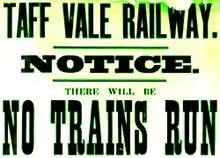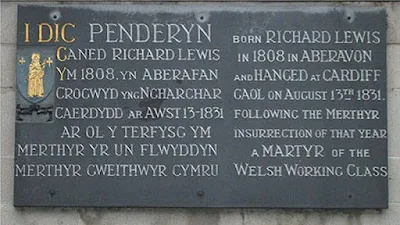In the early summer of 1831, many of the towns and villages of industrial Wales were marked by political and social unrest. Terrible working conditions in the mines and iron works were made even worse by wage cuts, and in some cases by the laying off men as demand for iron and coal fell away.In Merthyr Tydfil there were serious riots in the streets, and on 3 June 1831 a mob ransacked the building in the town where court records of debt were stored.
From May-June 1831, the Welsh working class exploded onto the pages of history in a ferocious uprising unprecedented in British history. Its roots lay in the deep discontent which had been evident for many years, the preceding years had seen the emergence of popular protest movements like the Barley-Meal Riots of 1801 and the South Wales strike of 1816, which paralysed the coalfields. Against a backdrop of a collapse in living conditions, with lack of proper sanitation where disease was rife and life expectancy within a working-class household was low, this led to simmering resentment.
In 1829 depression set in in the iron industry which was to last for three years. As a result Merthyr Tydfil Ironmasters made many workers redundant and cut the wages of those in work. Against a background of rising prices this caused severe hardship for many of the working people of the area and, in order to survive, many people were forced into debt
Often they were unable to pay off their debts and their creditors would then turn to the Court of Requests which had been set up in 1809 to allow the bailiffs to seize the property of debtors. As a result the Court was hated by many people who saw it as the reason for their losing their property. The low wages of the industrial workforce, poor working conditions and the implementation of the 'truck' system' by the iron masters, in which workers were not paid real money, but vouchers and tokens valid only in their masters own shops, contributed to ongoing social unrest.
Against this background the Radicals of Merthyr, as part of the National movement for political reform, organised themselves into a Political Union in 1830 to lead the local campaign for reform. In November 1830 they called for demonstrations in Merthyr to protest against the Truck System and the Corn Laws. The campaign was actually supported by some local Ironmasters. William Crawshay of Cyfarthfa Ironworks and Josiah John Guest of Dowlais Ironworks, for example, both supported the campaign. By the end of the year 1830 the campaign had broadened to embrace the Reform of Parliament, and the election of a Liberal Government in Great Britain led to a bill being brought before Parliament to reform the House of Commons. The Bill was welcomed by the Merthyr Radicals as a step in the right direction, although it did not give Merthyr a Parliamentary Constituency and only extended the right to vote to the Middle Classes rather than the workers. In April 1831, however, the Bill was defeated in a House of Commons vote, the Government resigned and a new General Election was called to fight on the issue of Parliamentary Reform.
Despite Crawshay's support for the Reforms he was forced, in March 1831, to announce cuts in the wages of his workers and redundancies. In May the wage cuts took effect and he made 84 of his workers. It was this, combined with similar situations in other ironworks, the hatred of the activities of the Court of Requests, that saw the increasing tension come to a head,
On 30 May 1831 at the Waun Common above Dowlais a mass meeting of over 2000 workers from Merthyr & Monmouthshire discussed petitioning the King for Reform, the abolition of the Court of Requests and the state of wages in the iron industry.
Then on 31 May, baillifs from the Court of Requests attempted to seize goods from the home of Lewis Lewis, known as Lewsyn yr Heliwr/ Lewis the Hunstsman, at Penderyn, near Merthyr. Lewis refused to let the take his property and, supported by his neighbours, prevented them from entering his home. The Magistrate, J.B.Bruce, was called and he arranged a compromise between Lewis and the bailiffs which allowed the latter to remove a single trunk belonging to Lewis.
The next day a crowd led by Lewis Lewis marched to the home of a shopkeeper who was now in possession took the trunk back by force, and prepared to march to Merthyr. On the march to Merthyr the crowd went from house to house, seizing any goods which the Court of Requests had taken, and returning them to their original owners. They ransacked the house of one of the bailiffs (Thomas Williams) and took away many articles. By this time the crowd had been swollen by the addition of men from the Cyfarthfa & Hirwaun Ironworks. They marched to the area behind the Castle Inn where many of the tradespeople of the town lived and in particular the home of Thomas Lewis, a hated moneylender and forced him to sign a promise to return goods to a woman whose goods he had seized for debt.
On the same day Thomas Llewellyn, a coal miner, attempted to hold a rally advocating reform at Hirwaun Common. However, the reformers met with a more militant group who wanted to take more radical action. The radicals killed a calf and dipped the white cloth of a reform flag in its blood.On its staff was impaled a loaf of bread, the symbol of their slogan and the needs of the marchers,
Bara neu Waed (Bread or Blood) creating a symbol of common suffering and of equality of humankind. They raised the flag on a pole and it was probably the first time the red flag of revolution was flown as a symbol of workers revolt.
Over the next two days some 7,000-10,000 workers marched on Merthyr Tydfil and the town was seized by the workers. After storming Merthyr, the rebels sacked the local debtors’ court and distributed the goods that had been collected. Account books containing debtors’ details were also destroyed. Among the shouts were cries of
Caws a bara (cheese and bread) and
I lawr â’r Brenin (down with the king).
The Magistrate J.B. Bruce arrived at the scene and realised that this was rapidly becoming a more widespread revolt against the Court of Requests. He and some other magistrates, quickly enrolled about 70 Special Constables, mainly from the town’s tradespeople, to help keep the peace, and then advised the Military Authorities in the town of Brecon that he may need troops sent.
Bruce, along with Anthony Hill, the Ironmaster of the Plymouth Works, tried to pursuade the crowd to disperse, but to no avail. He then had the Riot Act read in both English and Welsh. This also had little effect, and the crowd then drove the magistrates away and attacked Thomas Lewis’ house.
That evening, (the 2nd of June) the crowd assembled outside the home of Joseph Coffin, President of the Court of Requests, demanded the books of the Court and other books in the house, which they then burned in the street along with his furniture.
On hearing of this attack, Bruce decided that he would have to call in the troops after all, and soon, 52 soldiers of the Royal Glamorgan Light Infantry were despatched from Cardiff to Merthyr by coach, and a detachment of the 93rd (Sutherland) Highlanders were sent from Brecon.
Meanwhile the crowd had marched to the various ironworks and managed to persuade the workers to join them.On their march from Brecon, the Highlanders were mocked and jeered but eventually arrived at the Castle Inn where they were met by the High Sheriff of Glamorgan, the Merthyr Magistrates and Ironmasters and the Special Constables.
The crowd outside the Inn, now some 10,000 strong, again refused to disperse when the Riot Act was read for a second time and pressed ever closer toward the Inn and the soldiers drawn up outside.
Anthony Hill then asked the crowd to select a deputation to put forward their demands. They demanded higher wages, a reduction in the cost of items they used in their work and immediate reform.
The Ironmasters however flatly refused to consider any of these demands, and the deputation returned to the crowd. The High Sheriff then informed the crowd that if they did not disperse, the soldiers would be used against them. William Crawshay and Josiah John Guest also tried to get the crowd to disperse, but they became even angrier and the front ranks of the crowd tried to surround the soldiers. Lewis Lewis was hoisted onto the shoulders of some of the crowd and called for the soldiers to be disarmed by the rioters. The front ranks of the crowd surged forward and threw clubs and rocks at them and even managed to disarm some.
Soldiers fired into the crowd gathered around the Castle Hotel and over 16 rioters were killed and a great many others wounded, later to die of their injuries. Many injustices were committed by the authorities on that day. Not one of the soldiers received a bullet wound and the crowd was largely completely unarmed. The street outside Castle Hotel was said to have been running with blood, women were screaming and desperately looking for their husbands and sons.
The authorities were certain that this was not the end of the rioting and they moved their headquarters to a safer position at Penydarren House. That night the rioters searched for weapons ready for an attack the next day. They also sent word to the Monmouthshire ironworks in an attempt to obtain further support. By the 4th of June, more troops including the Eastern Glamorgan Corps of Yeomanry Cavalry and the Royal Glamorgan Militia had arrived in Merthyr. A troop of the Swansea Yeomanry Cavalry (under a Major Penrice) on arrival at Hirwaun, were ambushed when they stopped to rest, being greeted in an apparently friendly manner, but were soon surrounded, their weapons seized and they were forced to retreat to Swansea, where they re-armed and joined the Fairwood Troop for the march back to Merthyr.
A similar ambush was laid at Cefn Coed y Cymmer to stop ammunition being delivered from Brecon.
The Cardiff Troop of Glamorgan Yeomanry Cavalry (under Captain Moggridge) sent out to assist in the passage of the ammunition, was forced to retreat, being fired upon by the rioters and having rocks hurled at them from the hills above. Another troop of 100 Central Glamorgan Yeomanry (under Major Rickards) was sent to assist but were unable to break through the mob.
However Moggridge and the Cardiff Troop managed to bring the wagons safely to Merthyr by a different route but despite meeting various deputations from the rioters the ironmasters had not managed to persuade them to disperse.
On Sunday the 5th of June, delegations were sent to the Monmouthshire Iron Towns to raise further support for the riots and on on the 6th of June, a crowd of around 12,000 or more marched along the heads of the valleys from Monmouthshire to meet the Merthyr Rioters at the Waun Common.
The authorities decided that rather than wait for this mob to attack them they would take the initiative, and 110 Highlanders, 53 Royal Glamorgan Light Infantry Militia and 300 Glamorgan Yeomanry Cavalry were despatched to stop the marchers at Cefn Coed.
Josiah John Guest tried to address the crowd but to no avail, the Riot Act was read but had no effect, and then the Highlanders and Militia were ordered to level their muskets at the mob and the Yeomanry to draw their sabres. Words of command were given clearly and slowly so that the mob could hear them.With this the crowd gradually dispersed, only a hardcore remaining. Eventually they too gave way. No blood was spilled that day.
After the uprising on the evening of the 6th of June the authorities began raiding houses and arrested 18 of the rebel leaders. Lewis Lewis was found hiding in a wood near Hirwaun and a large force of soldiers escorted him in irons to Cardiff Prison to await trial.
The rising at Merthyr caused shockwaves through the British Government, and it was decided that at swift, strong action must be taken against the ringleaders of this movement. The trials began on the 13th of July at the Cardiff Assizes. 28 men and women were tried, 23 of them ironworkers
(12 colliers , 2 women, 2 shoemakers and one blacksmith).John Phelps, David Hughes, Thomas Vaughan and David Thomas were all found guilty of attacks on the houses of Thomas Williams and/or Thomas Lewis. Phelps was sentenced to transportation for 14 years, the others were sentenced to death
(but with a recommendation for transportation for life instead). Wounding a soldier received the death penalty, but soldiers could kill with no questions asked as long as the Riot Act had been read. Lewis Lewis and Richard Lewis (Dic Penderyn) were charged with attempting to murder a soldier, a Donald Black of the 93rd Highland Regiment, by stabbing him with a bayonet attached to a gun outside the Castle Inn on the 3rd June. They were both sentenced to death.
Dic Penderyn was a Welsh labourer and coal miner, who was born, Richard Lewis in Aberavon in 1808. He and his family moved to Merthyr Tydfil in 1819, where he and his father worked in the local mines. Richard was always known as Dic Penderyn after the village of Penderyn near Hirwaun where he lodged.
The people of Merthyr Tydfil were convinced that Dic Penderyn was not guilty and raised a petition demanding his release which was signed by over 11,000. Joseph Tregelles Price, A quaker Ironmaster from Neath, took up the case of Dic Penderyn and Lewis Lewis, and presented the petition to Parliament to have them transported instead. There was no evidence that Dic played any substantial part in the rising at all unlike Lewis who was definitely involved, and in fact many people stated on oath that Penderyn was not even present when Black was attacked, and that they also knew who had actually carried out the attack,
Lord Melbourne, the Home Secretary, reprieved Lewis Lewis, who was certainly one of those who were most responsible for the riots, and accused of inciting others towards revolution and he was subsequently transported to Australia for the rest of his life, but the Home Secretary well known for his severity, refused would not even consider reprieving Penderyn, and sought to make an example out of him, who was clearly seen to have been much less involved. Many believe that the reason, Penderyn was chosen to be hanged, was precisely because he wasn't one of the leaders, but a typical worker in the town and was simply targeted to show all other workers what would be in store for them if they stepped out of line.
Richard Lewis (Dic Penderyn) was taken from his cell at Cardiff Prison at Dawn on the 13th of August 1831, to the gallows at St.Mary Street, Cardiff and was executed before a large crowd, despite the appeal of thousands of people for his life. After he was cut down, his body was transported across the Vale of Glamorgan by his fellow workers and friends and thousands grieved and lined the route as Dic's coffin was taken from Cardiff to Aberavon where he was buried in St Mary's churchyard, Port Talbot where a memorial was placed on his grave by local trade unionists in 1966.. .
Outside the market on St Mary Street, Cardiff near the spot where he was executed, you will find a plaque in commemoration of his execution. To the last he protested his innocence, and his final words in Welsh were an anguished cry at injustice. “O Arglwydd, dyma gamwedd” “O Lord what an iniquity” he shouted, as the hangman’s noose was tightened.
In 1874, the Western Mail reported that a man named Ianto Parker confessed on his death bed that he stabbed the soldier and then fled to America fearing capture by the authorities, thus exonerating Dic Penderyn. Another man named James Abbott, who testified against Penderyn at the trial, also later admitted that he lied under oath.













